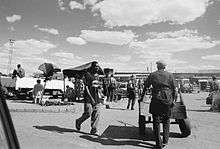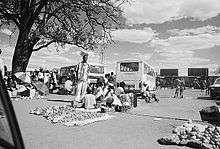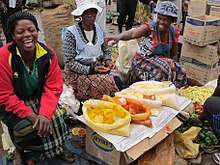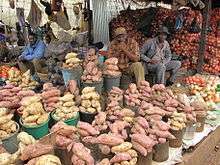Mbare, Harare
Mbare is a high-density, southern suburb of Harare, Zimbabwe.


It was the first high-density suburb (township), being established in 1907. At that time, it was located near the city cemetery, sewage works, and abattoir. It was originally called Harare (pronounced Ha-rah-reh) Township, a name later on used for the capital city itself. Harare is a corruption of Havarari, meaning 'They never sleep' and this was the name given to the Zezuru Chief of this northeastern part of Zimbabwe, a Chief Harava.
History
Mbare (formerly Harare) started to expand in about 1907 when the white settlers built a town called Salisbury, and thus created an influx of people coming from Mozambique, Zambia, and Malawi looking for employment. The phenomenon gave rise to urban development, but real growth was accelerated when Mbare moved from where Cold Storage Commission is today to its present location. The first council houses built were popularly known as Kaytor ("Old bricks"). The colonial term for these kinds of suburbs was the locations, very similar to housing projects in the USA. The area was largely populated by migrant workers while the local workforce preferred to maintain their rural homes (reserved places) and came to the city seasonally. During the 1940s there was a big shortage of workers as described in D. Sean Bott's Labour in colonial Zimbabwe. The council built Matapi flats and hostels to accommodate local male workers. They would work for a few days at a time and then return to their families in the rural areas. Today those flats are occupied by married couples.
Significant portions of Mbare were destroyed by police and military forces during Operation Murambatsvina in May 2005.
Economy and markets


Mbare has Mbare Musika, the largest farm produce market in Zimbabwe. Farmers deliver their fresh crops every morning and some travel from far away places like Mutare, Masvingo and Kariba to sell their produce. This area has fallen into disrepair in recent years.[1][2]
There are other market places in Mbare, including Mupedza Nhamo (a Shona word loosely translated as "The finisher of quandaries"). This is a market for cheap clothing, with shirts available for as little as $1 U.S, or second-hand shoes for $5 US. This market is frequented by people from Mbare and the surrounding area but has become a popular shopping location for middle class hipsters. Another market is Magaba (loosely translated to mean "tins"), a market place for metal goods and other craftsmanship. This is a hub for budding entrepreneurs and artists, making products such as cooking pots, cups, bathing basins and carpentry work such as tables, beds, chairs, display cabinets and coffins. These provide a livelihood for a substantial portion of the population of Mbare.
Mbare's most famous attraction is the Curio Market, the largest market for traditional artwork, including soapstone sculpture and Mbira instruments. The town also has large food and vegetable markets.
Through the central bus station Mbare Musika is linked to all major roads, and is the Hub linking buses to all different destinations in Zimbabwe and neighbouring countries. Trade and transport are the pillars of economy in Mbare.
Facilities
Education
Mbare has six government primary schools: Chirodzo, Gwinyai, Chitsere, Shingirai and Nharira. There are three faith schools: St Peter's Roman Catholic School, Chiedza, a Salvation Army church school, and Anglican-run St. Michaels Primary School.
The four secondary schools in Mbare are Harare High School, George Stark, St Peters High School and Mbare High School.
Hospitals
Hospitals in the area include Edith Oppermann Maternity Wing and Clinic, Mbare Flats Clinic, Matapi clinic and Beatrice Road Infectious Disease hospital.
Other prominent buildings
Mbare's features include Rufaro stadium, which hosted the sixth African Games. Dynamos F.C. (also known to its fans as "Dembare"), one of the country's top soccer teams, has its home ground at Rufaro Stadium, and it is also an international football ground capable of hosting topflight matches. For Independence Day in 1980 Bob Marley was personally invited by Edgar Tekere, and played a concert in Rufaro Stadium.[3]
Harare Cemetery is noted for its World War graves. Harare Magistrate Courts is situated in Mbare, a civil and criminal court without powers to prosecute serious cases.
Culture
In the Old bricks era jazz, tap dancing and concerts were popular in the town, and well-known singers Thomas Mapfumo, Hilton Mambo and Elisha Josam all came from Mbare. With later generations, the music known as zimdancehall became popular, and fans in Mbare developed a sound of shona music requiring instrumental tunes and play clacks as the dance. Prominent artists involved in the Mbare scene include Soul Jah Love, Killer T, Sir Calaz, and Kinner. Mbare has a public swimming pool called George Hartley, where live bands perform during the summer.
Other notable cultural locations in Mbare include the Mai Musodzi Hall, one of Harare's oldest theatres, named after Mai Musodzi, pioneer of education for women in Zimbabwe. The Mai Musodzi Hall is next to the Mbare Musika, and young adults go there to watch late 1990s action movies. Stodart Hall, Mbare's biggest community centre, hosted Sir Cliff Richard during his tour in the 1960s, and nowadays the recently-upgraded hall hosts DJ parties and club nights. The hall is also used for film screenings and as a place of last vigil for deceased national heroes.
A football field popularly known as Number 7 was extended with new gym facilities in the early 1990s, an open roof netball court and three outside basketball courts.
Media
Zimbabwe Broadcasting Corporation formerly Rhodesian Broadcasting Corporation had the first black newsreaders, and was the only media that could broadcast in the local vernacular languages chiShona and Ndebele. In 1956, Mrs Mlambo started a children's show called Mbuya Chirambakusakara.
Notable residents
References
- Nhambura, Fortious (17 July 2014). "The slow death of Mbare Musika". The Herald. Zimbabwe. Retrieved 24 November 2017.
- Nyakudya, Munesu (18 January 2014). "Ministers condemn Mbare Musika". NewsDay. Zimbabwe. Retrieved 24 November 2017.
- "Edgar Tekere Zimbabwe Politician". Zimbabwe Today. 14 April 2017. Retrieved 28 October 2017.
Edgar Tekere being the ZANU-PF Secretary General, personally invited Bob Marley to perform at Rufaro Stadium, for the official Zimbabwean Independence Celebration.